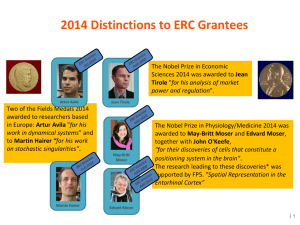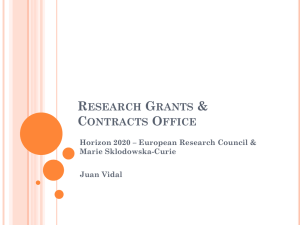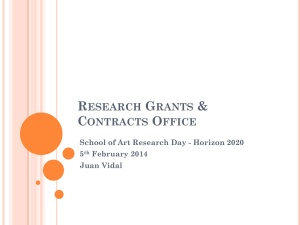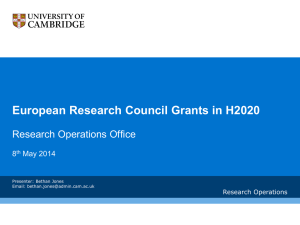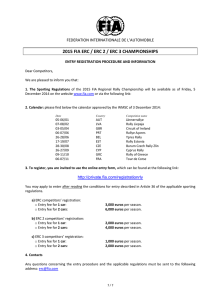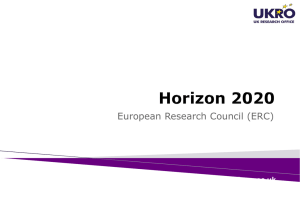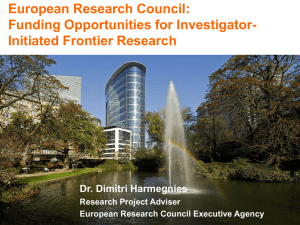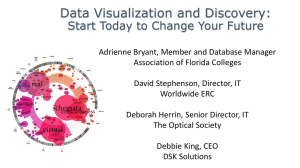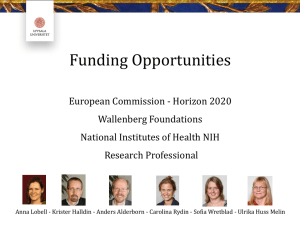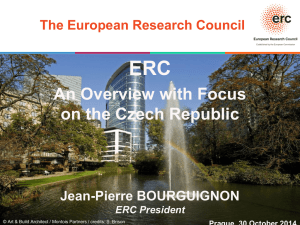The European Research Council What is ERC?
advertisement
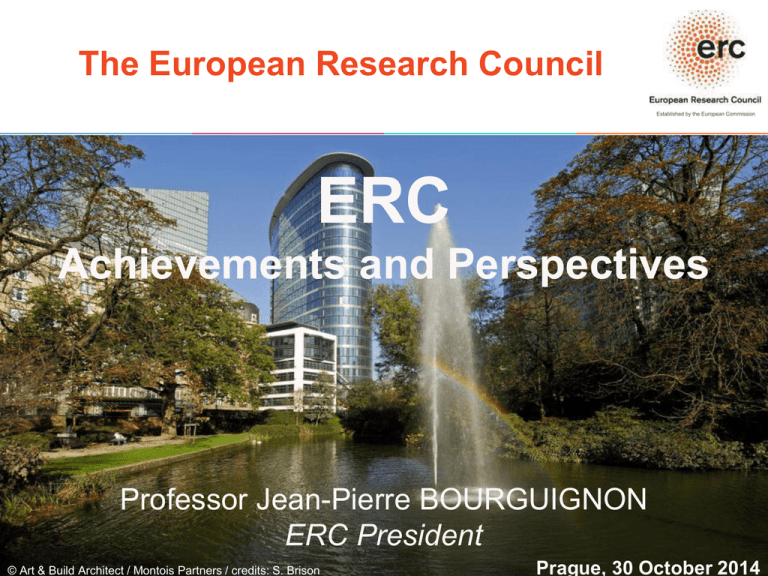
The European Research Council Established by the European Commission ERC Achievements and Perspectives Professor Jean-Pierre BOURGUIGNON ERC President © Art & Build Architect / Montois Partners / credits: S. Brison Prague, 30 October 2014 What is ERC? Established by the European Commission The European Research Council An autonomous pan-European funding body led by scientists set up by the EU in 2007 after a long struggle Mandate: to encourage the highest quality research in Europe through competitive funding of frontier projects Funded through the EU Framework programmes for Research and Innovation For the period 2014-2020, Horizon 2020 │2 What is ERC? Established by the European Commission Legislation Strategy A bottom-up, individual-based, pan-European competition with host institution in the EU or in an Associated State. Support for projects lad by individual scientists International peer-review No predetermined subjects (bottom-up) Support of frontier research in all fields of science and humanities Scientific governance by an independent 22-member Scientific Council, which has full authority over funding and evaluation Support by the ERC Executive Agency (autonomous) Only criterion: quality of research aiming for excellence │3 What is ERC? Established by the European Commission The European Commission • • • • Provides financing Guarantees autonomy of the ERC Assures ERC’s integrity and accountability Adopts annual work programmes The ERC Scientific Council • • • • • 22 members who are active researchers in their communities Appointed by the Commission Establishes overall scientific strategy Controls quality of operations and management Ensures communication with the scientific community The ERC Executive Agency (ERCEA) • • • • • • Executes annual work programme Implements calls for proposals Organises peer review evaluation Establishes and manages grant agreements with Host Institution Administers scientific and financial aspects Carries out communications activities The Importance of Basic Research Established by the European Commission Research and Innovation A linkage whose importance has grown in the last years because of the role attributed to innovation in competitiveness Existence of a number of short circuits between some results belonging to basic research that quickly triggered some new economic activities This a priori non focused financing of research has been done in the past, in the US notably by DARPA and DOE Presently, the best example is given by Korea, and the huge investments made there in basic research, to address the lack of tradition and under the pressure of its high-tech industry anxious to make it for the next major round of innovation. │5 ERC Funding Schemes Established by the European Commission Starting Grants Consolidator Grants starters (2-7 years after PhD) up to € 1.5 Mio for 5 years consolidators (7-12 years after PhD) up to € 2.25 Mio for 5 years Advanced Grants track-record of significant research achievements in the last 10 years up to € 3 Mio for 5 years Proof-of-Concept bridging gap between research - earliest stage of marketable innovation up to €150,000 for ERC grant holders │6 Creative Freedom Established by the European Commission ERC offers independence, recognition and visibility PI’s own choice of topic PI’s own choice of team 5-year financial autonomy Grants are portable ERC has become a quality label │7 Quality, Sole Criterion of Evaluation Established by the European Commission Evaluation has two components: Quality of the Research Project Ground-breaking nature Potential impact Scientific approach Quality of the Principal Investigator Intellectual capacity Creativity Commitment Referees and panels evaluate each component. │8 Evaluation of Proposals Established by the European Commission The ERC Scientific Council is responsible for proposing independent experts. Structure: 25 panels (6 in Social Sciences and Humanities, 10 in Physical Sciences and Engineering and 9 in Life Sciences) What makes the ERC evaluation exceptional? Highly international participation in panels Full autonomy of panels to decide Panel members and chairs based in 49 countries: 26 EU Member States, 7 Associated Countries, 16 outside Europe Remote referees based in 87 countries │9 Evaluation Panel Structure Established by the European Commission Social Sciences and Humanities Life Sciences LS1 Molecular & Structural Biology & Biochemistry LS2 Genetics, Genomics, Bioinformatics & Systems Biology LS3 Cellular and Developmental Biology LS4 Physiology, Pathophysiology & Endocrinology LS5 Neurosciences & neural disorders LS6 Immunity & infection LS7 Diagnostic tools, therapies & public health LS8 Evolutionary, population & environmental biology LS9 Applied life sciences & biotechnology SH1 Individuals, institutions & markets SH2 The social world, diversity and common ground SH3 Environment ,space and population SH4 The Human Mind and its complexity SH5 Cultures & cultural production SH6 The study of the human past Physical Sciences & Engineering PE1 Mathematics PE2 Fundamental constituents of matter PE3 Condensed matter physics PE4 Physical & Analytical Chemical sciences PE5 Materials & Synthesis PE6 Computer science & informatics PE7 Systems & communication engineering PE8 Products & process engineering PE9 Universe sciences PE10 Earth system science │ 10 ERC after 7 Years Established by the European Commission 4 500 researchers funded (65% are at an early-career stage); 64 nationalities represented (EU has 28!) Highly competitive (average success rate tending to 10%) Grants located in almost 600 different institutions in 30 countries 50% of grantees in 50 institutions Benchmarking effect: impact on national programmes and agencies; national funding for best "runners-up" Efficient and fast grant management Highly recognized by the research community beyond Europe 30,000 publications acknowledging ERC support by September 2014 │ 11 Priority to Young Scientists Established by the European Commission Two-thirds of ERC grants to early-stage Principal Investigators. │ 12 Developing a New Generation Established by the European Commission On average each ERC project team has six members. 2/3 of team members are in the initial phase of their career. + 15 000 PhD and post-doc researchers working in ERC teams. │ 13 Attracting Excellent Researchers Established by the European Commission 53% of non-ERA team members ''attracted'' to Europe with the ERC grant (10% of all team members) Composition of ERC teams (PIs not included) Analysis of 995 Starting and Advanced Grants EU: 67% Assoc. Countries: 12% non-ERA: 18% unknown: 3% │ 14 Success Rates per Country of HI Established by the European Commission *) First legal signatories of the first grant agreement taken into account ERC Grants versus Top Publications Established by the European Commission *) Host institution refers to the organisation with which the first grant agreement was signed│ 16 ERC Grants versus Global R&D Effort Established by the European Commission │ 17 2014 Distinctions to ERC Grantees Established by the European Commission 22/10/2014 f3.jpg (300×358) The Nobel Prize in Economic Sciences 2014 was awarded to Jean Tirole "for his analysis of market power and regulation". Artur Avila Two of the Fields Medals 2014 awarded to researchers based in Europe: Artur Avila "for his work in dynamical systems” and to Martin Hairer “for his work on stochastic singularities”. 22/10/2014 Jean Tirole The Nobel Prize in Physiology/Medicine 2014 was awarded to May-Britt Moser and Edvard Moser, together with John O'Keefe, "for their discoveries of cells that constitute a positioning system in the brain”. The research leading to these discoveries* was supported by FP5. "Spatial Representation in the Entorhinal Cortex” May-Britt Moser Hairer.jpg (310×233) http://plus.maths.org/content/sites/plus.maths.org/files/news/2014/Seoul/f3.jpg Martin Hairer 1/1 Edvard Moser │ 18 Horizon 2020 Established by the European Commission Horizon 2020 is the European Union's funding programme for research and innovation for 2014 – 2020 "supporting activities covering the whole spectrum from idea to market". Three principal pillars: Excellent science Industrial leadership Societal challenges │ 19 Horizon 2020 Excellent Science Pillar Established by the European Commission European Research Council Frontier research Future and Emerging Technologies Collaborative research to open new fields of research and innovation Marie Sklodowska Curie Actions Opportunities for training and career development Research Infrastructures (including e-infrastructures) Ensuring access to world-class facilities │ 20 Horizon 2020 Budget Established by the European Commission H2020 budget € 77 billion ERC budget € 13 billion FP7 budget € 50.5 billion ERC budget € 7.5 billion ERC Work Programme 2015 Established by the European Commission Publication date of first calls planned for Autumn 2014. Three ERC frontier research grants will be available under Work Programme 2015: Starting; Consolidator; and Advanced Grants. Restrictions on applications will apply to the 2015 calls based on the outcome of the evaluation of the 2014 calls (same in Work Programme 2014). Removal of indicative domain budgets. Panel budgets now allocated purely by demand. ERC Principal Investigators will continue to be able to apply for Proof of Concept Grants (now with three deadlines). Overhead rate: 25% │ 22 ERC Calls 2015 Established by the European Commission ERC calls Starting Grants ERC-2015-StG Consolidator Grants Call Publication Submission Deadline(s) 410 M€ October 2014 February 2015 605 M€ November 2014 March 2015 630 M€ February 2015 June 2015 DL1: February 2015 DL2: May 2015 DL3: October 2015 Budget ERC-2015-CoG Advanced Grants ERC-2015-AdG Proof of Concept ERC-2015-PoC 19 M€ January 2015 │ 23 The European Research Council Established by the European Commission More information on erc.europa.eu National Contact Point in your country erc.europa.eu/national-contact-points Follow us on EuropeanResearchCouncil ERC_Research │ 24
